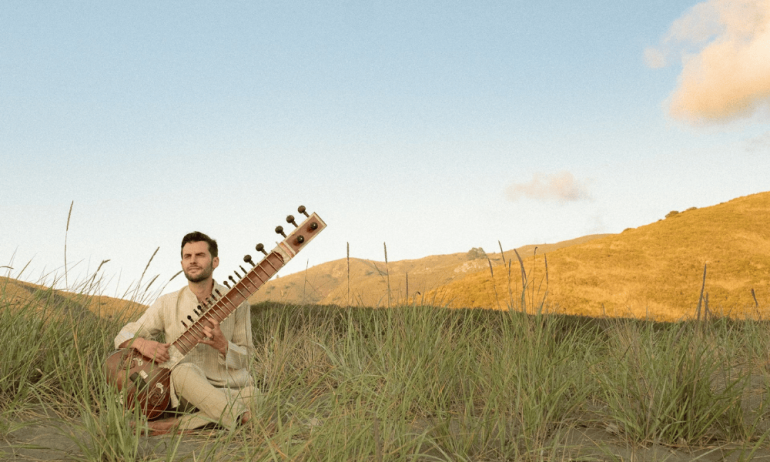In an interview with Boulder-born singer-songwriter Dafna, she discusses her experiences writing and producing music in LA. She touches on her organic songwriting and production process and recent exploration into having sessions with other producers.
As a woman in the industry, Dafna reflects on the lack of female producers and her own imposter syndrome, despite her evident talent. She encourages aspiring female musicians to leverage online resources and pursue their dreams independently.
Dafna’s album, “The Paradox of Choice,” features 14 songs and is set to release on May 24. There will be a virtual album release party that will be live streamed on Vier Live at 7pm MDT that same day.
Interview by Dakota Makinen for KGNU.
Listen
Interview Transcript
Dakota: I spoke with the Boulder, born and raised singer songwriter, Daphna Margarite. who goes by her first name, Dafna, about her experiences so far writing and producing her own music in LA.
Dafna: Moving here, like, there’s a lot more people who are in music and there are a lot more people who are really good at it. So it’s been really cool to see also just the different approaches people take to a career in music. Cause like, before, I just didn’t really know how many avenues there are to like have a career in music, but it’s like my roommate, she’s a songwriter full time and she writes songs mainly for other people. And it’s like cool to see her making money doing that. And then there’s just like, yeah, like so many different ways that people approach being an artist, too. So it’s just been like a huge learning experience. I think I moved here thinking maybe I would, like, stop producing for myself because I’d meet someone who’s really good and way better than me. But I think it’s cemented more that I really do enjoy producing for myself and that it wasn’t just out of necessity. It’s been like, I think, just made me feel more like myself, which has been great.
Dakota: Dafna has been in LA for almost two years now and currently works a full time job remotely as a software engineer.Yet she still has time to spend on her music.
Dafna: It’s not like I’m like, spending time driving somewhere and then being exhausted at the office and coming home and having no energy to do something. Like, I’m always just kind of home, so I just have the time to do that, and like, do what I enjoy.
Dakota: Dafna explained to me that while her software engineering job uses a different part of her brain as opposed to when she’s making music, the skills transfer to her work as a self taught music producer.
Dafna: I think there are a lot of the same skills when it comes to being able to like, use a computer and like, just Googling and stuff is like a huge part of both of the things because there’s a lot of stuff that I don’t know because I’m self taught just being able to like use my resources effectively and like also just like if there’s any issue with like something with like the program or something being able to troubleshoot it I guess is like easier when I have that background.
Dakota: Known for her relatable lyrics, comedic anecdotes on her dating experiences, and ability to connect with a wide audience by marketing her own music on TikTok, Dafna’s success is testimony to her dedication to her craft. She spoke to me about her songwriting process.
Dafna: Sometimes I have something happen and it’s just like instantly like, oh, I want to write about this. And I like kind of start with like one line and then go from there. Other times, like a lot of my songs more recently have been, it’s been less me sitting down to write a song and it’s more of me just like an idea comes and I like write it down and then maybe I like revisit it or it just like all flows out of me at that moment. Like I’ve had a lot of just like 2am like voice memo things and then the next morning I like go and finish it.
Dakota: Dafna has been exploring what it’s like to have someone else produce her songs for her.
Dafna: With like sessions and stuff here it’s like you’re expected to be in the headspace to write a song and my songwriting has always just been more natural. It’s always just like when the idea comes and I go with it. So like forcing ideas has been like a different exercise and definitely been like challenging me more as a songwriter.
Dakota: I ask Dafna how her identity as a woman shapes her experience in the music industry.
Dafna: I think it is interesting, that I feel like there are so many women I know that are in music but it’s rare for me to come across someone who like also like produces and stuff. Of the sessions I’ve had out here I think only one of them was with a girl and it was we were writing something together. It’s every other session I’ve had it’s always a guy producing it or like writing it or like two dudes and me. It makes me like want more girls to produce. I’m like if I can do it like literally anyone can it’s not that hard. And I think a lot of guys just tend to make everything they do just seem super complicated and obviously there is like the technical side of everything and yeah, but like anyone can learn it, like if you just enjoy it. I think that’s also a reason why I’ve just stuck to producing ’cause I see how little other people do it, but also I don’t really produce for other people yet ’cause I have major imposter syndrome, so maybe, maybe I’ll get over that one day.
Dakota: When someone has imposter syndrome, they can struggle with believing in their abilities and can feel as though they aren’t skilled enough, despite their previous successes or evidence that shows the contrary.Dafna furthered on this idea.
Dafna: Part of it is like, oh, like, I can produce my own songs because I know what the vision is. Also, like, producing, sometimes it happens really fast and I’m able to produce a song in, like, a day, but sometimes it, like, takes, like, months where I’m, like, tweaking it and I still don’t like how it sounds.And for me, I’m not trying to rush that process because it’s a song for me and I know what to expect of it. I think as soon as there’s the pressure of doing it for other people, I’m like, oh, I’m not actually, like, a real producer. Like, I don’t actually know how to do it fast or with someone else’s vision in mind. Also, like, I know that I have the skills to produce so I should be able to apply it for that, but it’s just like a scary thing. But then like there are so many guys who have used like GarageBand once and call themselves a producer So like I I don’t know I think, I think I got to take some male confidence and apply it to my life
Dakota: Dafna gave some advice to other young women looking to kick start their career in the music industry.
Dafna: They don’t really need anyone else, like, to start things. I think all you really need is like a laptop or even just a phone and like a dream. And then like everything is on the internet. Like, you can learn so much from YouTube and from Google and just from just posting your songs on social media, I think that gives, like, so many opportunities to, like, open the door, And, yeah, at the end of the day, like, it really does not matter what people think about what you’re posting, like, as long as you’re, like, loving the work that you’re making, I think that’s the most important part, and it’s just, like, continuing to just grow and do it when you’re enjoying it, and I think if it’s something that I don’t know, that you hate, then maybe it’s not for you, but I don’t know.I think I’ve just been loving to just keep doing it as long as I’m enjoying it and not forcing it otherwise.
Dakota: Dafna’s album, “The Paradox of Choice,” comes out on May 24th. As of now, six of the 14 songs have been released on all major streaming platforms.
Dafna: I have each single and then I have all the other songs that came out before kind of like waterfall with it, just so if people listen to that song then they’re kind of forced to listen to the next ones if they’re like in there already. I’ve just been releasing half of it slowly.It’s been a really fun project to work on and excited for everyone to hear it.
Dakota: In Boulder, Colorado, this is Dakota Makinen.




















